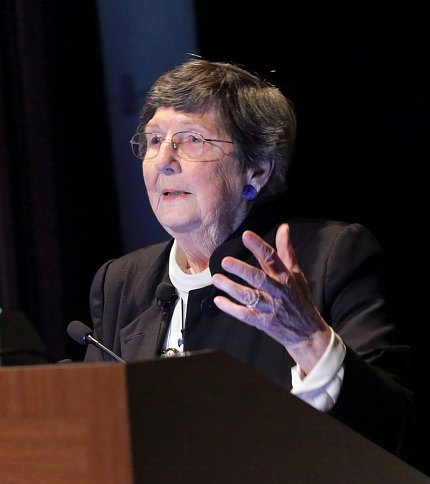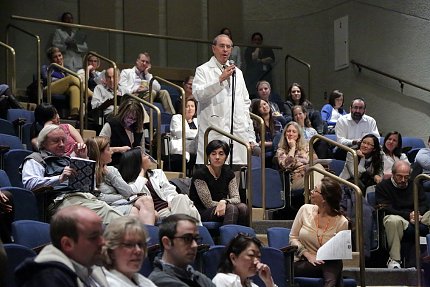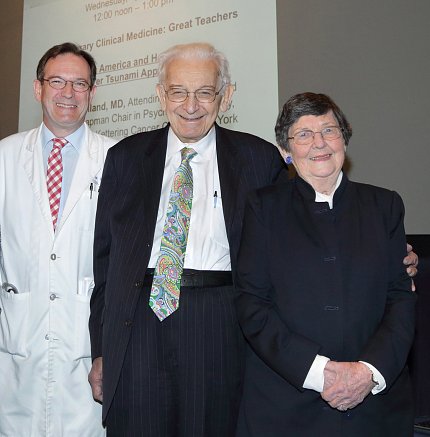Positive Outlook on Life Key To Healthy Aging

Photo: Ernie Branson
Aging isn’t as bad as it seems. Sure, there are downsides to growing older. But, on average, seniors report a better quality of life than people much younger, said Dr. Jimmie C. Holland at the Contemporary Clinical Medicine: Great Teachers Grand Rounds Lecture in Lipsett Amphitheater recently.
“Life doesn’t actually get better, but you perceive it differently, and with greater gratitude,” said the 88-year-old Holland, an attending psychiatrist and Wayne L. Chapman chair in psychiatric oncology at Memorial Sloan Kettering Cancer Center. “As my husband, Jim, who has been ill the last couple of years, often says, ‘I’m glad to be here. I’m glad to be anywhere.’”
This is true in every country in which studies have been done, including both developed and developing countries.
One study in the U.S. asked 350,000 people to rate their well-being on a scale from 1 to 10. Well-being is high in our twenties, but it goes steadily down to a nadir at 55, when responsibilities for aging parents, children and career expectations peak. By middle age, she said, “People get distressed and down. They think, ‘If it’s this bad at 50, by 75, I will be done in.’ However, from 60 and older, people accept mortality and begin to appreciate life and its joys, making the most of each day.

Photo: Ernie Branson
Holland concedes there are problems with aging. Senior citizens have a higher risk for cancer, diabetes and heart disease. They gain weight easily, fall down more often and are often stigmatized; many are socially isolated.
“We can’t move around quite as well as we did, our bones creak a little more and we must deal with losses of family members and friends,” she explained.
She became interested in aging 10 years ago when she was part of a study of older patients receiving chemotherapy. They were divided into two groups. One received a booklet about coping and the other received monthly phone calls for 6 months, simply to check on their mental status. Afterwards, the group that received phone calls reported decreased depression, loneliness and anxiety. Asked what was helpful, they said, “Someone cared about me between the visits to the oncologist.” This led Holland and her group to develop a telephone psychotherapy that has been validated not only to lower loneliness, depression and distress, but also to increase patients’ sense of meaning and purpose.
It has also been found in other studies that people with a sense of purpose have a slower decline in cognitive ability than those without one, she said. Having a sense of humor is also important. “When you can’t change something, it helps if you can turn it around and laugh about it,” she said.

Photo: Ernie Branson
Holland follows her own advice. At the suggestion of one of her granddaughters, she began a book club for seniors 3 years ago, the Vintage Readers’ Club. The readings began with the Harvard Classics. The club meets monthly to eat lunch, talk about the reading and relate it to their lives. It has helped to stimulate them to think beyond themselves, both personally and socially. There’s only one rule: no complaining of aches and pains.
Keeping older Americans active and engaged has another benefit, noted Holland, which is economic. Estimates suggest elders hold $25 trillion collectively in the U.S. In other words, they have great potential as consumers.
To experience that benefit, though, “we’re going to have to keep them healthy,” Holland said. By 2030, roughly 20 percent of the population will be over 65. The burdens placed on the health care system will soon be enormous. Even today, the system is ill prepared to handle the medical needs of an aging population. Holland said hospitals “send people home sicker and quicker,” adding stress to younger family members who must take on extensive caregiving roles.

Photo: Ernie Branson
The foundation for healthy aging begins with a healthy attitude toward aging, which leads to better health habits, best cultivated before entering one’s golden years. If that can be done, she said, “You fare better when you’re older in terms of overall function and lower disability.”
For all these reasons, it’s better to look at aging from a positive perspective. “We’re all aging one day at a time. But it’s better to call it living one day at a time and making the most of it,” Holland concluded.
